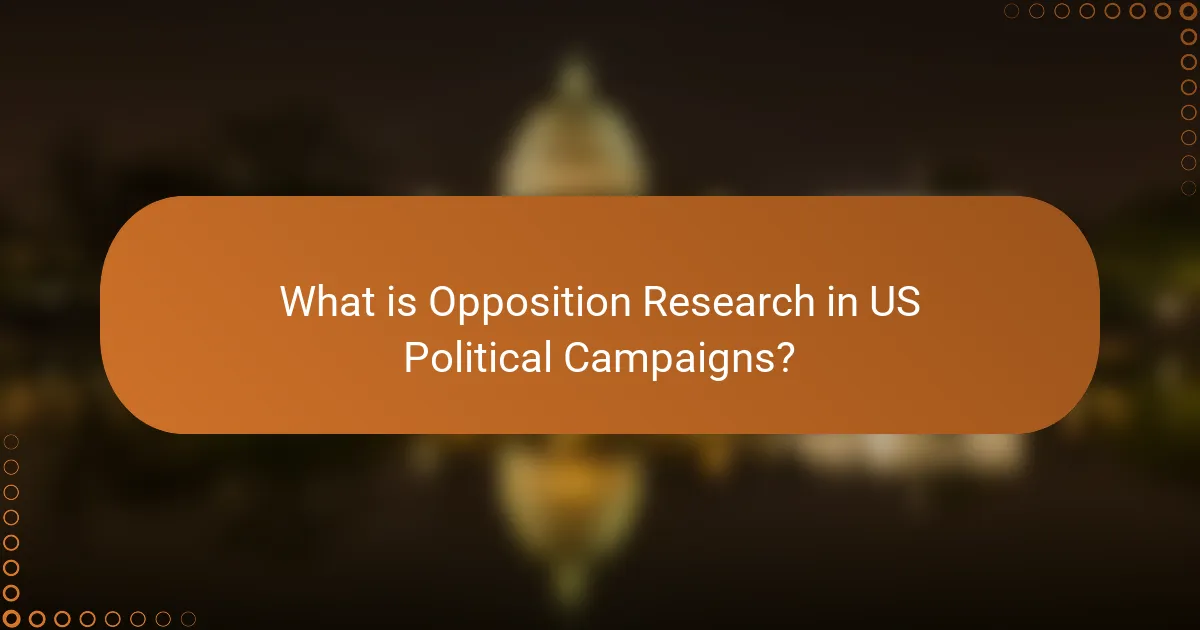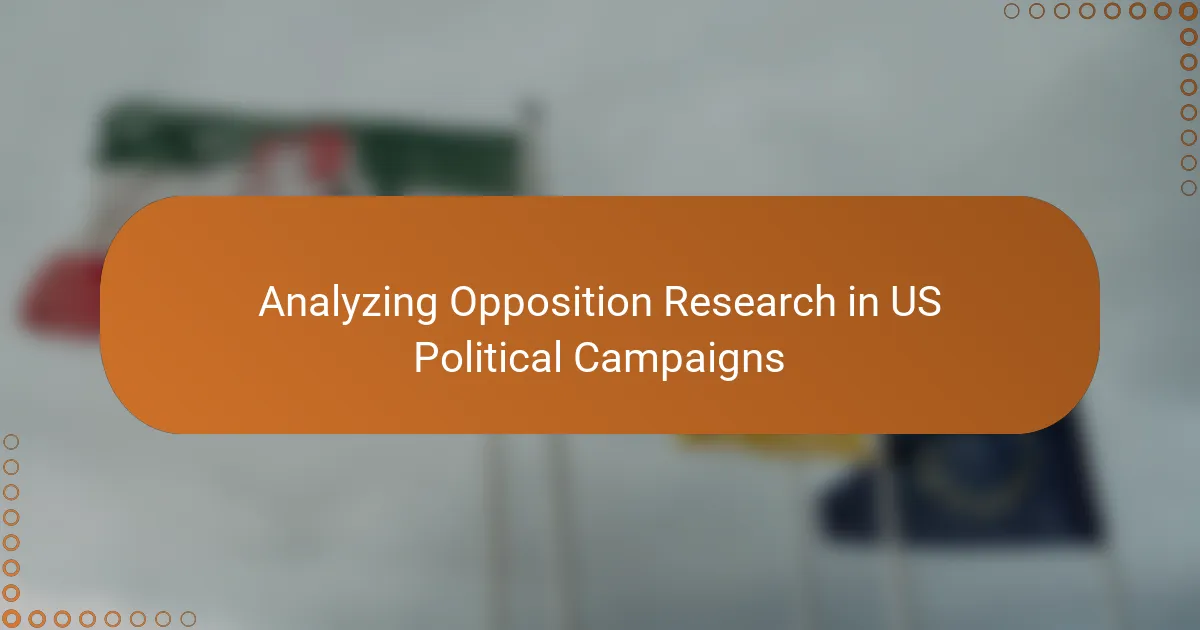Opposition research in US political campaigns is the systematic investigation of political opponents to uncover damaging information that can be leveraged for strategic advantage. This practice involves analyzing public records, past statements, and personal histories to create negative advertisements or messaging aimed at swaying public perception and influencing voter behavior. Since the mid-20th century, opposition research has become a standard tactic in political strategy, exemplified by notable instances such as the 2004 presidential campaign against George W. Bush. This article provides a detailed analysis of the methods, implications, and historical context of opposition research within the framework of US electoral politics.

What is Opposition Research in US Political Campaigns?
Opposition research in US political campaigns refers to the practice of investigating and compiling information about political opponents. This research aims to uncover damaging information that can be used to discredit opponents. It often includes examining public records, past statements, and personal history. Campaigns utilize this information to create negative advertisements or strategic messaging. The goal is to influence public perception and voter behavior. Opposition research has been a common tactic since the mid-20th century. Notable examples include the opposition research conducted during the 2004 presidential campaign against George W. Bush. This process is considered a standard part of modern political strategy.
How is Opposition Research conducted during political campaigns?
Opposition research is conducted by gathering information about political opponents to identify weaknesses. Campaign teams typically employ various methods, including public records searches, media analysis, and social media monitoring. They analyze past statements, voting records, and public appearances for inconsistencies. Interviews with former associates or opponents may provide additional insights. Campaigns may also utilize specialized firms that focus on opposition research. This process helps to uncover damaging information, which can be used strategically in campaigns. The goal is to create a comprehensive profile of the opponent, highlighting vulnerabilities. Historical examples show that effective opposition research can significantly influence electoral outcomes.
What techniques are commonly used in Opposition Research?
Common techniques used in opposition research include background checks, public records analysis, and media monitoring. Background checks involve investigating an opponent’s personal history, including education and employment. Public records analysis examines documents like court filings and financial disclosures. Media monitoring tracks news coverage and social media activity related to the opponent. Additionally, interviews with former associates can provide insights into an opponent’s character and behavior. These techniques help uncover information that may be relevant in a political campaign.
Who typically conducts Opposition Research for political campaigns?
Opposition research for political campaigns is typically conducted by specialized teams or firms. These teams often consist of political consultants, researchers, and analysts. They are tasked with gathering information about opponents to identify weaknesses and vulnerabilities. Campaigns may hire dedicated opposition research firms for this purpose. Additionally, some larger political parties have in-house teams focused on opposition research. The goal is to uncover damaging information or inconsistencies in an opponent’s record. This practice has been a common strategy in U.S. political campaigns for decades. It is crucial for shaping campaign narratives and strategies.
Why is Opposition Research important in US Political Campaigns?
Opposition research is important in US political campaigns because it helps candidates identify and exploit weaknesses in their opponents. This strategic analysis can reveal past controversies, policy failures, or personal missteps. By understanding an opponent’s vulnerabilities, campaigns can craft targeted messaging and attack ads. According to a study by the Pew Research Center, 80% of political strategists believe opposition research is crucial for effective campaigning. Furthermore, it allows candidates to preemptively address potential attacks. This proactive approach can shape public perception and influence voter behavior. Ultimately, opposition research plays a vital role in competitive political environments.
What impact does Opposition Research have on voter perception?
Opposition research significantly influences voter perception by shaping public opinion about candidates. This tactic uncovers negative information about an opponent, which can be strategically disseminated. The exposure of damaging details can lead to decreased trust and credibility for the targeted candidate. Studies indicate that voters often rely on negative information when making electoral decisions. For instance, research by the Pew Research Center shows that negative campaigning can sway undecided voters. Additionally, a study published in the Journal of Politics found that opposition research impacts voter turnout and candidate favorability. These findings demonstrate that opposition research plays a crucial role in shaping the electoral landscape.
How can Opposition Research influence campaign strategies?
Opposition research can significantly influence campaign strategies by providing insights into an opponent’s weaknesses. Campaign teams use this information to craft targeted messaging and attack ads. They can highlight discrepancies in an opponent’s record or statements. This strategy aims to sway undecided voters by framing the opponent negatively. Historical examples show that effective opposition research can alter the trajectory of a campaign. For instance, during the 2004 presidential election, the Bush campaign utilized opposition research to question John Kerry’s military service. This tactic successfully shifted public perception and impacted voter decisions. Overall, opposition research serves as a critical tool in shaping campaign narratives and strategies.
What are the ethical considerations in Opposition Research?
Opposition research involves gathering information on political opponents to gain a competitive advantage. Ethical considerations include the accuracy of information, respect for privacy, and the potential for misinformation. Researchers must ensure that the data collected is factual and not misleading. Inaccurate claims can damage reputations and misinform voters. Privacy concerns arise when personal data is used without consent. Additionally, the intent behind the research should focus on transparency and integrity in political discourse. Ethical opposition research promotes informed decision-making in elections while avoiding unethical tactics.
How do legal frameworks shape the practice of Opposition Research?
Legal frameworks significantly influence the practice of Opposition Research by establishing guidelines for permissible actions. These frameworks include laws on privacy, defamation, and campaign finance. For example, the Federal Election Commission regulates the use of campaign funds for research activities. Violating these laws can lead to legal repercussions, including fines or disqualification from elections. Additionally, state laws may impose stricter regulations on data collection methods. Understanding these legal boundaries is crucial for researchers to avoid unethical practices. Compliance with these frameworks ensures that opposition research remains a legitimate tool in political campaigns.
What are the potential consequences of unethical Opposition Research?
Unethical opposition research can lead to significant consequences for political campaigns. It can damage the credibility of the candidate involved. Voters may lose trust in candidates who engage in unethical practices. Negative public perception can arise from revelations of deceitful tactics. This can result in decreased voter support and campaign donations. Legal repercussions may also occur if laws are violated during research. Additionally, unethical practices can provoke retaliation from opponents, escalating negative campaigning. Ultimately, the integrity of the political process may be undermined, harming democracy.
How does Opposition Research differ between various political parties?
Opposition research varies significantly between political parties due to their strategic objectives and resource allocation. Democratic parties often focus on social issues, emphasizing candidates’ stances on healthcare and education. They may highlight discrepancies in a candidate’s public statements versus their voting record. Conversely, Republican parties typically target economic policies and fiscal responsibility, scrutinizing candidates for any perceived failures in managing budgets or taxes.
The methodologies also differ; Democrats may utilize grassroots efforts and social media campaigns to disseminate information. Republicans often leverage traditional media and direct mail to reach voters effectively. Historical examples illustrate these differences; during the 2016 election, Democrats emphasized Donald Trump’s business dealings, while Republicans focused on Hillary Clinton’s email controversy.
These contrasting approaches reflect the core values and priorities of each party, shaping how they conduct opposition research.
What challenges do campaigns face when conducting Opposition Research?
Campaigns face several challenges when conducting opposition research. One major challenge is the difficulty in accessing reliable information. Many sources may provide biased or incomplete data. Another challenge is the time constraints inherent in campaign cycles. Limited time can hinder thorough investigation and analysis. Additionally, campaigns must navigate legal and ethical boundaries. Missteps in these areas can lead to negative repercussions. Furthermore, the evolving nature of information technology complicates research. New platforms can obscure data and create misinformation. Lastly, internal conflicts within the campaign can impede research efforts. Disagreements on strategy can lead to inconsistent research priorities.
What are the key components of an effective Opposition Research strategy?
An effective Opposition Research strategy includes thorough data collection, analysis, and presentation. Data collection involves gathering information on opponents’ backgrounds, records, and public statements. This information can be sourced from public records, media reports, and social media. Analysis requires identifying patterns and inconsistencies in opponents’ narratives or actions. This helps to highlight vulnerabilities. Presentation is crucial for communicating findings clearly to campaign staff and stakeholders. Effective opposition research must be timely to influence campaign strategies. Additionally, ethical considerations must be adhered to, ensuring compliance with legal standards. These components are essential for creating a robust strategy that can impact electoral outcomes.
What types of information are most valuable in Opposition Research?
Valuable information in opposition research includes a candidate’s voting record, public statements, and financial contributions. These elements reveal positions on key issues and potential conflicts of interest. Additionally, personal history, such as past scandals or legal troubles, can be critical. Researching affiliations with controversial groups or individuals also provides insight into a candidate’s character. Public perception data, including polling results and media coverage, can highlight vulnerabilities. Finally, social media activity can uncover damaging or inconsistent statements. Each type of information serves to create a comprehensive profile of an opponent, aiding strategic decision-making in campaigns.
How can campaigns leverage technology in Opposition Research?
Campaigns can leverage technology in opposition research by utilizing data analytics and social media monitoring tools. These technologies enable campaigns to gather extensive information on opponents quickly. Data analytics can process large datasets to identify patterns in an opponent’s voting history or public statements. Social media monitoring tools track opponents’ online activities and public sentiment in real-time.
Moreover, artificial intelligence can help analyze speech patterns and predict opponents’ strategies. Campaigns can also use digital databases to access public records and past campaign data efficiently. This technological integration allows for more informed decision-making and strategic planning. Research indicates that campaigns employing these technologies can gain a competitive edge by responding proactively to opposition tactics.
What best practices should be followed in Opposition Research?
Best practices in opposition research include thorough fact-checking and accurate sourcing of information. It is essential to gather data from credible and reliable sources. This ensures the validity of the claims being made. Additionally, researchers should maintain a clear and organized database of findings. This aids in tracking information and identifying patterns. Collaborating with legal experts is also crucial to avoid potential defamation issues. Understanding the context of the information can help in framing it appropriately. Regularly updating research as new information arises keeps the data relevant. Focusing on both strengths and weaknesses of the opposition provides a balanced view.
Opposition research is a critical component of US political campaigns, involving the investigation and compilation of information about political opponents to identify weaknesses and vulnerabilities. This article examines the methods, techniques, and ethical considerations surrounding opposition research, highlighting its importance in shaping campaign strategies and influencing voter perception. It also discusses the role of technology in enhancing research efforts, the challenges faced by campaigns, and the best practices for conducting effective opposition research. By analyzing historical examples and current practices, the article provides a comprehensive overview of how opposition research impacts the electoral landscape.
